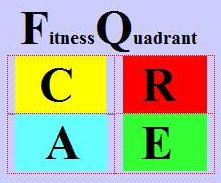

|
|
|
 |
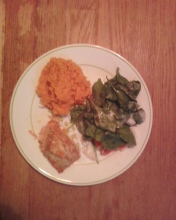
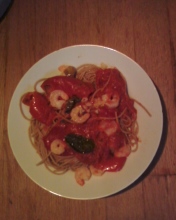
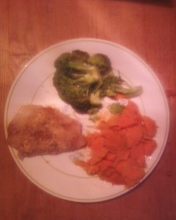
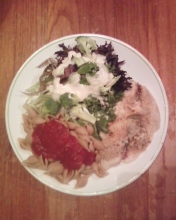
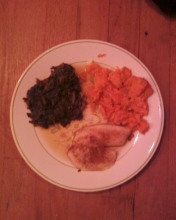
Choose
Your Path:
Learn how to customize for you individually what you eat, how much you eat and how often you eat, so you can maintain energy and health as you don't eat too much to gain body fat - but just the right amount to only lose your body fatand not your healthy lean metabolism boosting muscle!
Eating correctly is a very important component in the synergy of The Fitness Quadrant. We learn to eat synergisticly -in synergy with the the other 3 quadrants, and supportively - in support of creating a fast metabolism. Healthy effective weight loss and fat loss are totally explained in detail. For those of you you that want to keep things simple, there are easy approximation techniques for you to follow for eating the right amounts of food and at the right times. For those of you that would like to be detailed and figure it all out there are detailed formulas using bodyweight, lean body mass, proteins, starchy carbs and fibrous carbs to get it exactly right. The concepts of caloric balance and lifestlye changes are also explained for maximum results. Blood sugar charts make fat loss very simple to understand.
If the body is not fed with a small balanced digested meal no further apart than approximately every 3 hours maximum, the stomach empties and the metabolism will turn catabolic and the body feed upon itself and cannibalize existing lean, mainly muscle, to keep itself alive replacing life supportive cells like heart cells and the like, resulting in lean loss and increased aging. By eating an individually proportioned balanced meal, or feeding, every 3 waking hours we keep our bodies continually fueled so we can become healthier through time. As we stimulate with exercise and grow healthier and stronger in between workouts. We should graze like a lean Elk, but not gorge like a fat Bear.
The Fitness Quadrant book shows you how in detail to safely and effectively lose weight, and 3 blood glucose charts are explained in detail. This is one of the 3 charts from the book for losing body fat with creating ideal bood glucose levels:
-
- - - - - - - - - - - - - - - - - - - - - - - - - - - - - - - - - - - -
- - - - - - - - - - - - - - - -
HIGH
STORE
FAT, BURST OF INFLAMATION, INSULIN RUSH, GLUCAGON DROPS
-
- - - - - - - - - - - - - - - - - - - - - - - - - - - - - - - - - - - -
- - - - - - - - - - - - - - - -
LOSE
FAT
• • • • • •
IDEAL
•
•
•
•
•
•
•
•
•
•
•
•
•
•
•
•
•
•
•
GAIN
LEAN •
•
•
•
-
- - - - - - - - - - - - - - -•- - - - - - - - - - - - - - - - - - - - -
- - - - - - - - - - - - - - - - - - •- - -
•
•
•
•
•
•
LOW
•
•
•
•
•
LOSE
LEAN MUSCLE, LIPOPROTEIN LIPASE INCREASE
. .
. . .
. . .
. . .
. . .
. . .
. . .
. . .
. . .
. . .
. . .
. . .
. . .
. . .
. . .
. . .
.
time
→ → → ↑
↑
↑
↑
↑
↑
→
→
meal 1
meal 2
meal 3
meal 4
meal 5
meal 6
sleep
→ → → awake →
→
→ → → → → → → → → → sleep
We consider water to be in the E Quadrant due to the fact that it is something, as with food, that we take into our bodies. Water should be customized to our bio-individuality. One method is to multiply our body weight by .55 to determine how many daily fluid ounces we are to consume. Not enough water, chronic dehydration, can cause muscle cramps.
Here is what you will get when you purchaseThe Fitness Quadrant book. Following is a list of the Table Of Contents from this section of The Fitness Quadrant book:
|
Synergistic Eating . . . . . . . . . . . . . . . . . . . . . . . . . . . . . . . . . . . . . . . . . . . . . . . . . .
What To Eat, How Much To Eat, and When To Eat…………………………….……. All Calories Are Not Equal……………………………………………………………...... Metabolism: Catabolic and Anabolic………………………………………………..….. How Often
Should We
Eat?…………………………………………………………....… How Much
Water Should We
Drink?……………………………………….………...… Is There
A Best Time To Drink
Water?………………………………………………..... Rate Of
Food and Drink Intake +
Quantity…………………………………………...…. Food Flow
- 3
Stages Of The Movement Of Food:…………………………………..... Add A
Lean Protein With A Complex Carb – Fats Are
Built In…………………......... We Eat
Protein For Cell Repair And Carbs For
Energy……………………………..…. What To
Eat First In A Meal? 3 Basic
Ways:…………………………………………... Protein
First, Then Fibrous Carb, Then Starchy
Carb………………………………...... Protein First, Then Starchy Carb, Then Fibrous Carb………………………………….. Negative Choices And Their Consequences…………………………...……………..... Avoid
Eating Bad Fats – Saturated And
Hydrogenated……………………………..... The
Thermic Effect Of
Foods……………………………………………………..…...….. Cycle or
Variable
Eating…………………………………………………………….…....... Cheat
Day……………………………………………………....……………………............ Caloric
Cycling For Fat
Burning………………………………………………….....….…. Normal FQ
Day vs Higher Protein/Lower Carb
Day……………………………..…..….. Caloric Balance……………………………………………………………………........…… Adjust Calories For Individual Days And Events……………………………...……..… Activities And How Many Calories Burned Per Minute……………………………….. Avoid Simple Sugars, Eat Complex Carbs………………………………………....…..…. Carbohydrates Are Essential……………………………………………………....…….... Carbohydrates - The different Types……………………………………………..…..….. Fruits……………………………………………………………………………...........…….. What About Alcohol?…………………………………………………….......……………. Carbohydrates - The Glycemic Index and Glycemic Load……………....……………..... The Glycemic Index………………………………………………...………….….........……. Making The Carbs As Low Glycemic As Possible………………………….....………… Food As Fuel Blood Sugar/Glucose Charting……………………………….....………… The Healthy Effects Of Ideal Blood Glucose Levels……………………….....…………. Spiking Blood Sugar (Glucose) Too High……………………………………..........…….. Crashing Blood Sugar (Glucose) Too Low…………………………………......………… An Ideal Day Without Exercise – An “R” Rest Day………………………....………….. DAILY BLOOD SUGAR LEVELS………………………………………….…...........…….. An Ideal Day With Anaerobic Exercise…………………………………….......…………. DAILY BLOOD SUGAR LEVELS WITH EXERCISE……………………..........……….... What Not To Do – How Fat Is Stored:……………………………………….....………… DAILY BLOOD SUGAR LEVELS………………………………………….…............…….. Meal Timing – When and What To eat…………………………………….....………....... Meal Timing Phase 1: Pre-Anaerobic - Build Energy…………………….....……….…… Meal Timing Phase 1: Pre-Cardio – Reduce Glucose……………………….....…….…… Meal Timing Phase 2: During Cardio & Anaerobics………………………………........... Meal Timing Phase 3: After Workout - Anabolic Growth………………………….....…. Timeline Examples:………………………………………………………………...........….… Strategic Eating…………………………………………………………………….........…… Goofed?……………………………………………………………………………...........…... Feel Your Energy Waves……………………………………………………........…………. Blood Sugar Is Our Gauge………………………………………………………........……... .. Choose
Your Path: Approximation Method or Calculation Method…………….…………. Two Types Of Meal Plans: Approximation & Calculation……………………..…....…... Approximation……………………………...……………………….………...…..........….…. Technique 1:…………………………………………………………………….........………. Technique 2:…………………………………………………………………….........………. Calculation……………………………..……………………………..………..........………... Calculation Based On Lean Body Mass…………………………………......…………….. Calculation Based On Total Body Weight…………………………………......………….. Determine Your Daily Caloric Percentages……………………………….….......…...……. Results Of Macronutrient Imbalances………………………………………......….………. Synergistic Eating………………………………………………………………..........…….... Protein Sparing…………………………………………………………...…………...........…. Combine A Lean Protein With A Starch Carb And A Fibrous Carb For Every Meal.… Lean Proteins & Starch Carbs & Fibrous Carbs……………………………………......….. Vegetarian Meal Combinations With Complete Proteins…………………………....…… Complementary
Vegetarian Protein
Sources……………………………………….…......... Vegetarian Protein + Starchy Carbs + Fibrous Carbs…………………………….......…… Create A Complete Protein By Combining Complimentary Proteins:……………...…..… Supplements As Meal Replacements……………………………………………......…….... “Snacks” Must Also Contain Protein + Carbs…………………………………........….… Use A Calorie Counter To Determine What & How Much………………………...….…. Control Your Body Composition………………………………………….…….….......…… How Much To Eat? Put your self in your future………………………………….....…….. Choosing
Food - Reading
Labels Realistically………………………………….......…….. Low
Fat………………………………………………………………………..……..........….... Fat
Free…………………………………………………………..………….…..........………... Low Sugar or Lower Sugar………………………………………………........……..………. Net Carbs………………………………………………………………….........……..………. Focus On The Ingredients!………………………………………………......………..…….. Choose Wisely – Now That You Know………………………………….....………..…….. Eating Log………………………………………………………………..........……… |
256 256
256 256 256 257 257 257 258 258 258 258 259 259 260 261 262 262 262 262 263 263 264 264 265 266 266 266 266 267 269 269 269 270 270 271 271 272 272 273 273 274 274 274 275 275 275 275 275 276 277
278 278 278 278 278 279 279 280 281 282 283 283 283 284 284 285 285 285 286 286 287 287 287 288 289 289 289 289 290 290 291 |